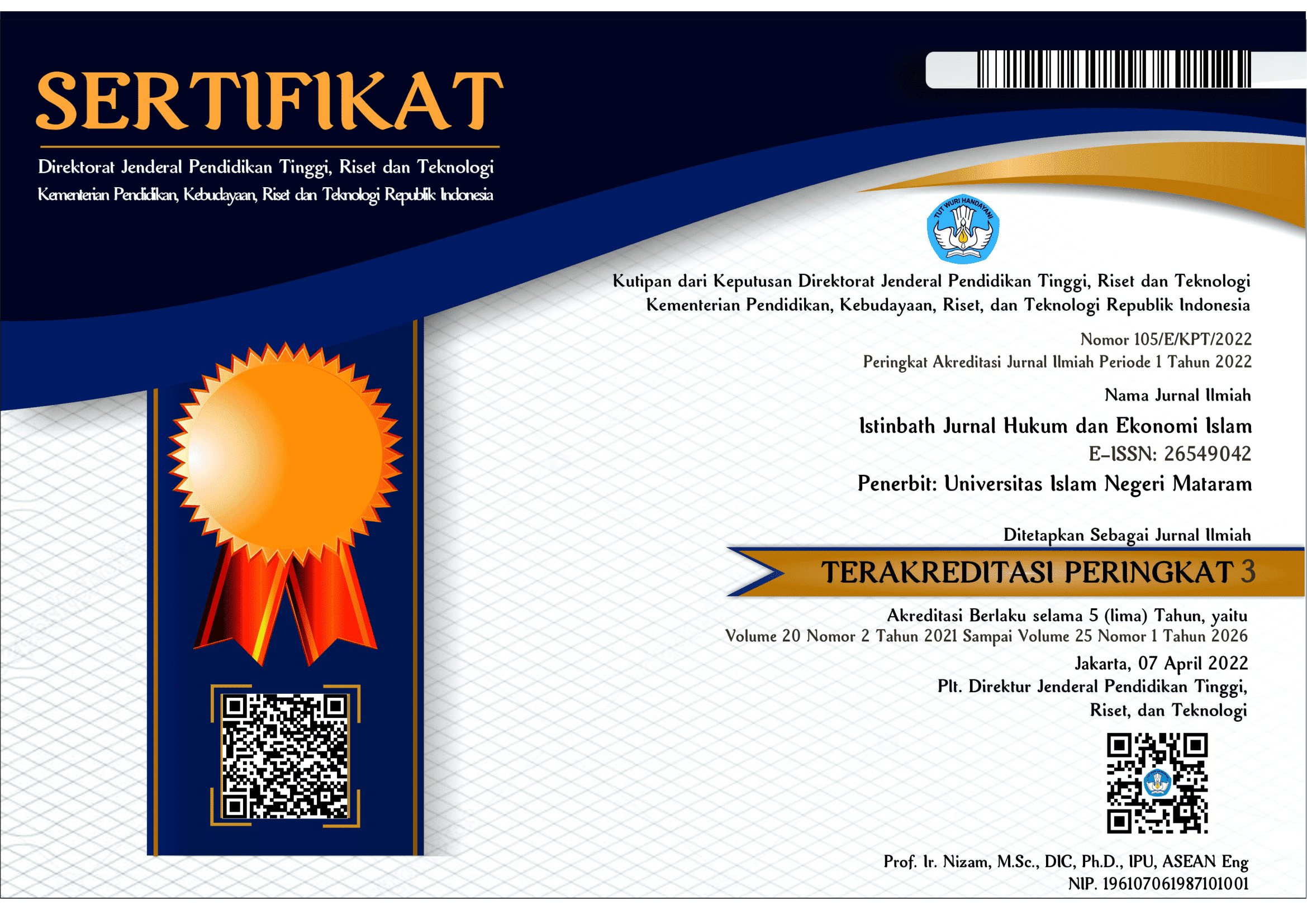FEMALE CIRCUMCISION (BETWEEN SHARIAH LEGAL EVIDENCE AND GOVERNMENT REGULATIONS)
DOI:
https://doi.org/10.20414/ijhi.v24i1.923Keywords:
Female circumcision, madhhab shafii, government regulations, citizen compliance, maqashid shariaAbstract
The law of female circumcision in Indonesia is still a controversy between scholars, medicine, and the state. This study aims to analyze the obligation of citizens to comply with Government Regulation No. 28 of 2024, which prohibits the practice of female circumcision, from the perspective of the Shafii School, where this madhhab actually encourages it. This study uses the library research method to examine primary and secondary sources related to hadith, fiqh, madhhab Syafii, contemporary fatwa, and medical and legal aspects in Indonesia. The analysis was carried out using the approach of hadith criticism, ushul fiqh, maqashid shariah, and fiqh madhhab Syafii. The results of the study show that there is a contradiction between the classical views of the Shafii School that tend to advocate female circumcision, including the MUI fatwa, and the results of the 32nd NU Congress in Makassar. However, the principle of obedience to the government is also emphasized in this school. This study found that the sharia basis for female circumcision is dzanni, with generally weak supporting hadith and medical aspects that aggravate female circumcision that can be carried out with the support of the ushhul fiqh approach, maqashid sharia, and fiqh madhhab Syafii. In conclusion, despite differences of opinion, citizens' compliance with Government Regulation No. 28 of 2024 can be justified from the perspective of the Shafii School by considering that it does not contradict Islam. This study suggests the need to review Islamic law in fatwa institutions in Indonesia.
References
Alifah, Rafidha Nur., Nisa, Alfiana Ainun., Nugroho, Efa & Hermawan, Dwi Yunanto. (2024). Female Genital Mutilation (FGM) in Indonesia: Systematic Review. MPPKI The Indonesian Journal of Health Promotion (November 2024) Vol. 7 No. 11, 2631.
Arafah, Intan. (2020). Pendekatan Sadd Adz-Dzari’ah Dalam Studi Islam. AlMuamalat: Jurnal Hukum dan Ekonomi Syariah 5, no. 1, 72. https://doi.org/10.32505/muamalat.v5i1.1443
Az-Zuhaili, Wahbah. (1994). Al-Wajiz fi Usul Fiqh, Beirut: Dar al-FikriDOI: https://doi.org/10.56338/mppki.v7i11.6165
Kawakib, Johnson., Syuhud, Hafdz. (2021). Implementing the Concept of Sadduadzari’ah in Islamic Law (Perspective of Ibn Al-Qayyim Al-Jauziyah and Ibn Hazm). International Journal of Philosophy 9, no. 4, 193. https://doi.org/10.11648/j.ijp.20210904.13
Keputusan Muktamar PBNU ke 32 Tahun 2010
Komnas Perempuan. (2018). PERSIMPANGAN ANTARA TRADISI DAN MODERNITAS Hasil Kajian Kualitatif Praktik Pemotongan/Pelukaan Genitalia Perempuan (P2GP) di 10 Provinsi 17 Kabupaten/Kota
Nurdhin Baroroh. (2018). METAMORFOSIS ‘ILLAT HUKUM’ DALAM SADADZ- DZARI’AH DAN FATH ADZ-DZARIAH (SEBUAH KAJIAN PERBANDINGAN), Al-Mazaahib: Jurnal Perbandingan Hukum 5, no. 2. 294, https://doi.org/10.14421/al-mazaahib.v5i2.1426. 18
R. Celorio. (2022). Women and International Human Rights in Modern Time: A Contemporary Casebook. Cheltenham: Edward Elgar, P.3.
Rofiah, Khusniati. (2018). TEORI SISTEM SEBAGAI FILOSOFI DAN METODOLOGI ANALISIS HUKUM ISLAM YANG BERORIENTASI MAQASHID AL-SYARI’AH (Telaah atas Pemikiran Jasser Auda). Istinbáth Jurnal of Islamic Law/Jurnal Hukum Islam ISSN 1829-6505 vol. 15, No. 1. p. 1-162. DOI: https://doi.org/10.20414/ijhi.v15i1.138.
Suhartini, Andewi. (2012). Ushul Fiqh. Direktorat Jendral Pendidikan Islam Kemenag RI
Syaifuddin. (2016). MAQASID SHARIAH JASSER AUDAH DALAM PENGEMBANGAN PRODUK KEUANGAN SYARIAH. Istinbáth Jurnal of Islamic Law/Jurnal Hukum Islam ISSN 1829-6505 vol. 15, No. 1. p. 1-162. DOI: https://doi.org/10.20414/ijhi.v15i1.143
Ummu Isfaroh Tiharjanti, (2003). Penyakit Genetik Karier Resesif dalam Perkawinan Inbreeding. UIN Sunan Kalijaga
UNFPA. (2024). Kondisi Perempuan Indonesia Tahun 2024. SPHPN. Kementerian Pemberdayaan Perempuan dan Perlindungan Anak Republik Indonesia. 15
VOA Indonesia. “VOA Indonesia, Peraturan Menteri Kesehatan RI Soal Sunat Perempuan Telah Dicabut.” Jakarta, Desember 2018. https://www.voaindonesia.com/a/peraturan-menteri-kesehatan-ri-soal-sunat-perempuan-telahdicabut/ 1839905.html
Wahbah Az-Zuhaili. (2011). Fiqih Islam wa Adillatuhu. Disunting oleh Budi Permadi. Diterjemahkan oleh Abdul Hayyie Al-Kattani. Vol. 2. Gema InsaniWHO, World Health Organization. WHO Guidelines on the Management of Health Compilation Form Female Genital Mutilation. WHO, t.th.
Downloads
Published
How to Cite
Issue
Section
License
Copyright (c) 2025 Ahmad Mundzir, Moh Irfan, Taufiq Andre Setiyono, Raharjo Raharjo

This work is licensed under a Creative Commons Attribution-ShareAlike 4.0 International License.





